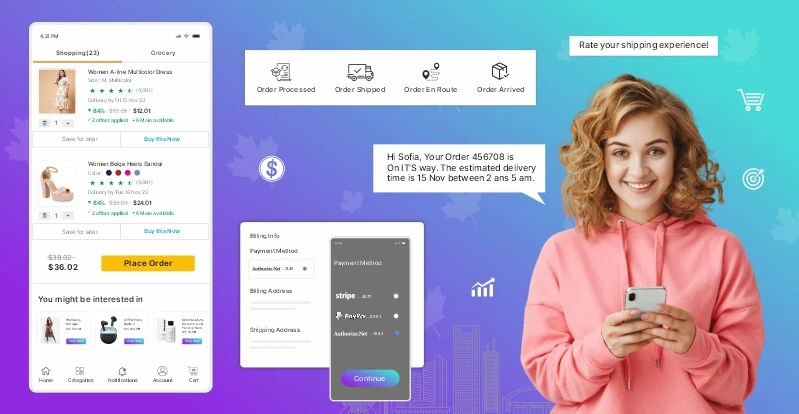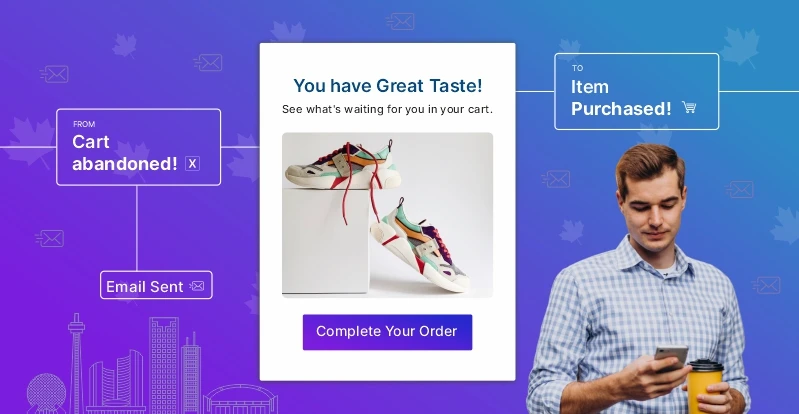Optimizing M-commerce for the Canadian Shopper

Table of Contents

Get The Print Version
Download a PDF version for easier offline reading and sharing with coworkers
The evolution of mobile commerce is reshaping the online business landscape, influencing a wide range of industries such as retail, banking, finance, and social commerce. The impact is particularly noticeable in the Canadian market, where the growing prominence of mobile commerce is influencing business growth.
According to research, “M-commerce market share is around 60% of the total ecommerce market.” Therefore, investing in m-commerce is a strategic decision that keeps businesses in sync with the changing trends in consumer behavior.
An optimized mobile website provides consumers access to various products, from groceries and medicines to appliances and clothing. This accessibility caters to changing consumer preferences and expands the business reach.
Businesses stand to gain several benefits as the influence of mobile commerce grows. These include increased customer engagement, convenience, and the ability to reach a larger market. Exploring the future possibilities of m-commerce becomes critical for remaining competitive in the online landscape.
In this blog, we will look at the main advantages of m-commerce and its potential for the current landscape to grow in the Canadian market.
Key Reasons M-commerce is Growing
Many reasons contribute to the growing rate of m-commerce; we have found the major one; let’s have a look below:
Increase rate of Mobile Device Use
The use of mobile commerce is majorly increasing in the today’s world. This is because of the significant use of smartphones. This device allows customers to explore more products, efficiently improving their overall product experience.
Convenience Focused
Today’s customers look for convenience, increasing the need for mobile-friendly commerce. Using a small device, people can buy things from anywhere, anytime, without any restrictions.
Enhancement of Mobile Marketing
As most customers shop from their mobile devices, the eCommerce vendors target this device for marketing. Finding the target audience is much easier on a mobile phone than on an offline store, making it easy.
Faster Networking
Mobile commerce is growing because of the use of high-speed networking. With the help of an uninterrupted network, customers can connect with the online store with ease. It further helps the business connect with the right customer by choosing the best online platform where they interact.
Choose M-commerce for Better Conversion
There are a lot of benefits in m-commerce; it helps improve the conversion rate, which is the core benefit. Let’s look at how m-commerce can grow conversion and better retention rates.
Better User Interface
Customers want an easy online purchasing experience. Thus, a smooth user interface is critical in m-commerce. User-friendly interfaces that are easy to navigate are essential for expedited and hassle-free transactions. It guarantees a seamless user experience that keeps up with the ever-evolving pace of mobile commerce.
For example, let’s consider the functionality of the Amazon mobile application. Its one-click functions and customer-friendly layout simplify the shopping experience, making it simple for consumers to navigate, choose products quickly, and finish transactions.
This feature is helping them to stay on top of the eCommerce business. A seamless m-commerce process can help businesses drive their customers better by offering a seamless user experience.
Positive Customer Experience
To ensure an outstanding outcome from your online store, improving customer experience is the key necessity. Using refined technology like AI, AR, and VR; mobile commerce may improve the client experience.
For example, augmented reality can be used on the user’s mobile app if you have a furniture shop. It will let people see furniture in their homes before they buy it. Virtual reality (VR) displays immersive product experiences, while AI-driven chatbots offer customized advice. This combination of technologies makes shopping easier and gives customers a more involved and personalized experience.

It will help provide customers with an exceptional and delightful experience. This fosters customer loyalty and establishes a new benchmark for online furniture retail.
Besides, with the help of optimized mobile solutions, the customers can use multi-device. It will help them to change the device and start the process where they have stopped. This will eventually improve their satisfaction and ensure the users get a seamless experience.
Highly Convenient
Adopting m-commerce offers consumers exceptional ease. It helps all kinds of customers to buy their preferred products from any device and platform.
Let’s take the example of college student Sarah, who is intensely interested in cosmetics. She can easily buy her favorite skincare products using her phone. It’s making shopping convenient and comfortable while browsing the internet.
In addition, the customer can also use their favorite social media platforms while checking the reels. With just a tap, it will help Sarah browse and buy things from a beauty brand’s Instagram shop.
The combination of mobile commerce and social media platforms accommodates her hectic schedule and offers a delightful buying experience. Hence, investing in mobile commerce can help the end-users to get their preferred products conveniently at their doorstep without compromising on their hectic schedule.
Real-time Support
Every online shopping site offers real-time support to offer a better shopping experience. Think about Emily, a professional in an IT firm who gets her groceries through mobile commerce. When she runs into a problem with her order, the supermarket app’s real-time help feature immediately links her with a customer service agent to take care of her problems.
In addition, the mobile commerce platform’s real-time tracking makes it easy for Emily to keep track of the grocery delivery status while managing her work obligations. It eventually helps her save time; this live tracking and instant support combo makes a more enjoyable and stress-free shopping experience.
Order tracking and customer service are being grown and setting a new standard for the eCommerce business with the exposure of mobile commerce. Besides, it helps the customers to trust the brand, positively improving customer loyalty and resulting in higher retention.
Smooth Payment Process
Most of the customer face issues with processing their order. They like to purchase products from the online store but often can’t complete them due to a complex payment process.
According to Statista, due to the increased number of mobile payment users, 72.9% of all retail eCommerce will be conducted via mobile commerce in 2021, and this number is expected to increase in the coming years.
Therefore, having a smooth payment process is essential. M-commerce banking can solve this problem effectively. Customers have various ways to shop, such as UPI, pay later, net banking, and debit/credit cards.
Consider the example of Alex, who loves to purchase from online shopping sites. If he gets to pay easily and has various alternatives, including card payments, pay later, and UPI, using a well-known fashion app, he will be much happier with the overall purchase.
It will help him select the one that best suits his needs. Customer loyalty is fostered by this user-friendly approach, which also promotes successful transactions. It makes the online purchasing process a hassle-free and joyful experience by choosing m-commerce and flexible payment options.
Better Cart Management
With the growing rate of eCommerce, the cart abandonment problem is increasing. Most people keep their products in the cart instead of checking them out due to a complex checkout process. Therefore, managing your online shopping cart is very important.

It’s critical for avoiding cart abandonment in the growing eCommerce market. Think about Rose, who paused at the register despite loading her cart with Christmas and New Year’s gifts. The online store used a targeted marketing technique to address this. She was notified through customized emails and social media posts about the special prices on her chosen products.
Her attention was caught by this focused marketing, which also encouraged her to finish the transaction and take advantage of the holiday discounts. Such marketing techniques have successfully lowered cart abandonment rates during holiday sales.
Online stores can convert missed sales into profitable transactions. They can do this by addressing problems and offering attractive incentives. This helps ensure that customers have a satisfying shopping experience.
Future of M-commerce for Online Business
The future of mobile commerce is marked by a vital upward. According to recent research, by 2022, 6.9% of retail transactions occurred via mobile devices. It’s expected to rise by 10.4% by 2025. Businesses increasingly recognize the importance of using mobile commerce to remain competitive in the ever-changing digital landscape.
Changing Trends in Mobile Commerce
The growing importance of Mobile Search Engine Optimization (SEO) emphasizes the need for mobile-responsive websites to accommodate the ever-increasing smartphone user base. As users increasingly use their smartphones for online transactions, websites must be optimized for mobile devices.
Furthermore, Mobile Reconnecting, a strategic location-based marketing approach, is gaining importance in the m-commerce era. This trend allows businesses to target potential customers based on their location precisely. It improves the precision of their marketing efforts.
As consumers navigate the digital sphere primarily through mobile devices, these trends highlight the importance of businesses adapting quickly. Mobile-responsive design and strategic location-based strategies are more than just trends; they ensure better customer satisfaction and business growth.
Artificial Intelligence-Powered Shopping Assistants
Combining AI and ML tools is a critical trend-altering mobile commerce. AI-powered virtual shopping assistants will help with personalized recommendations, purchasing decisions, and smooth transactions.
Smart assistants with advanced tech like language processing improve user experience and increase customer satisfaction.
Intelligent Chatbot Assistants
M-commerce chatbot assistants are evolving into powerful driven by AI agents. We designed these bots to be compatible with mobile commerce platforms. They provide personalized assistance, such as visual search and voice interaction.
According to a HubSpot survey, 71% of people use chatbots to solve problems quickly. Additionally, they actively engage with users. Chatbot Assistants’ advanced features will boost customer engagement and conversion rates, leading to mobile commerce success.
Adoption of Blockchain Technologies
The adoption of blockchain technology is reshaping the eCommerce business. Blockchain ensures a trustworthy environment for mobile transactions by providing enhanced security and transparency, fostering increased consumer confidence.
Companies using this advanced technology improve financial transaction security and establish a reliable and transparent mobile commerce system. Using blockchain increases trust and resilience in digital transactions, adapting to the changing landscape.
Use of PWA
Progressive Web Apps (PWAs) significantly benefit eCommerce businesses by seamlessly combining the strengths of web and native mobile applications. Businesses can improve user experiences with PWAs by providing faster load times, offline functionality, and push notifications, resulting in higher user engagement. According to research, a site using PWA can improve speed performance by 63% compared to its previous mobile site.
The web browser is similar to an application. Users don’t need to download or install separate apps. This makes it easier for them to access. PWAs provide a responsive and consistent interface across devices, ensuring a pleasant shopping experience.
Furthermore, their ability to operate offline ensures uninterrupted browsing and purchasing, a critical advantage in areas with inconsistent network connectivity. Overall, PWAs enable eCommerce businesses to provide a more efficient, engaging, and accessible platform to their customers.
Implementation of IoT
The Internet of Things (IoT) transforms eCommerce by creating a more seamless and efficient business environment. Smart devices become interconnected through IoT, enabling automated and streamlined transactions. According to Columbus Global Research, “the IoT in retail market is expected to be worth $94.44 billion by 2025”.
This improves inventory management in online businesses, with real-time tracking and restocking triggered by IoT-enabled sensors. Personalized recommendations based on IoT data analytics improve product discovery and improve customer experiences.
Furthermore, IoT improves security by using connected devices to protect transactions and customer data. IoT in online stores enhances efficiency and creates an effective ecosystem that meets tech-savvy consumers’ expectations.
Final Words
The value of a mobile-first strategy for eCommerce stores must be balanced. Businesses prioritizing mobile responsiveness provide better user experiences, leading to higher conversion rates, increased customer satisfaction, and positive business growth. Because people widely use smartphones, attracting and retaining customers requires a consistent mobile experience.
A mobile-optimized eCommerce store adapts to various devices and changes in consumer preferences, fostering trust and loyalty. Investing in mobile optimization is crucial in today’s digital world. This investment will lead to long-term success and provide a competitive advantage in eCommerce.
Connecting with m-commerce experts can help offer your business the best solutions. Grow your business positively and provide a great experience to your end-customers. Stay on the top of the eCommerce business with seamless mobile-optimized solutions.



